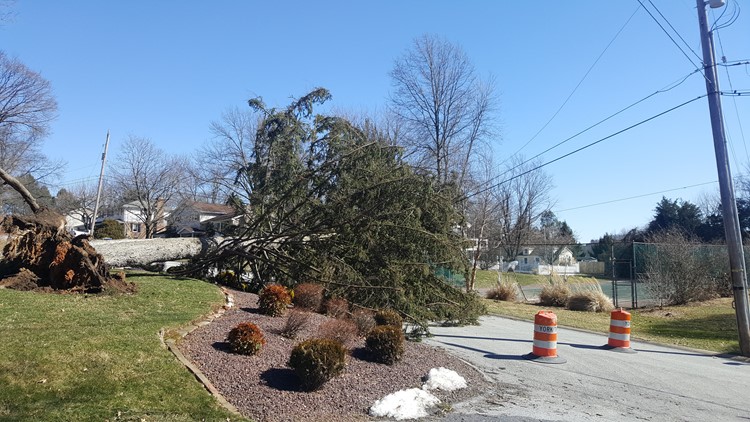As the winds that have swept through Central Pennsylvania finally begin to die down, some residents are dealing with power outages, storm damage, or both.
Here are some safety and insurance information for those who have damage, courtesy of State Farm.
Power Outage Tips
Before the outage
- Power outages can happen at any time and are unavoidable, but the costs associated with them can be lessened by installing a home backup generator at a home or business.
- Have a place in your home where flashlights, a battery-powered radio, and extra batteries can be easily found.
- If you know the outage is coming, set aside extra water and buy or make extra ice. You can use the ice to keep perishable items cool.
- Make sure the battery in your smoke detector is fresh. Test the smoke detector on a monthly basis to make sure it’s working.
- Keep an appliance thermometer in the freezer. If the freezer is 40 degrees Fahrenheit or colder when the power returns, all the food is safe.
During the outage
- If possible, use flashlights instead of candles for emergency lighting. Candles used in unfamiliar settings can be dangerous fire hazards.
- Turn off or disconnect any appliances, equipment, or electronics that were on when the power went out. When power comes back on, it may come back with momentary “surges” or “spikes” that can damage equipment such as computers and motors in appliances like the air conditioner, refrigerator, washer, or furnace.
- Leave one light on so you know when the power returns.
- Avoid opening the refrigerator and freezer. This will help keep your food as fresh as possible. Be sure to check food for signs of spoilage.
- Use generators safely. If you have a portable generator, only run it outdoors with adequate ventilation. Never use a generator indoors or in attached garages. The exhaust fumes contain carbon monoxide, which can be deadly if inhaled.
- Listen to the radio for updates.
Be careful with Candles
- Candles caused 3% of the reported home fires, 4% of home fire deaths, 7% of home fire injuries, and 6% of direct property damage during this period. On average, 29 home candle fires were reported per day. (NFPA)
- More than one-third (36%) of home candle fires started in bedrooms. These fires caused 39% of the associated deaths and 45% of the associated injuries. (NFPA)
- 11% of fires began with a mattress or bedding; these fires caused 17% of the home candle fire deaths. (NFPA)
- Extinguish all candles when leaving a room or before going to sleep and do not use candles in sleeping areas.
- Keep candles away from combustibles such as clothing, books, decorations, window blinds, and curtains.
- Keep candles away from high-traffic areas where they can be easily knocked over, including any area accessible to children or pets.
- Place candles on stable surfaces in non-tip holders that grip the candle.
- Place candles in holders that can’t burn and are big enough to collect dripping wax.
- A safer alternative to open flame candles are battery-operated flameless candles.
After a severe windstorm and damage
- Avoid driving if possible. If you have to travel, turn around if the road is flooded or blocked by debris.
- Stay away from downed power lines. Anything touching the power line can carry a charge. Report the downed line and avoid the area.
- Clean up or rope off dangerous areas. Cover wind-damaged windows with tarps and plywood until an inspector can assess the damage.
- Wear appropriate clothing. Sturdy, closed-toe shoes or boots, long sleeves and gloves are best for inspecting damage and handling debris.
- Avoid using candles or torches to inspect damage. Sparks from an open flame could ignite a fire or cause a gas-related explosion in a damaged building.
- Shut off the power if you smell something burning, see frayed or sparking wires or suspect a gas leak. Turn off the main circuit breaker and the natural gas and propane tanks.
- Use caution around debris. Sharp objects, broken glass or exposed nails may cause injuries that could lead to infection.
Storm damage repair and fraud
- Neighborhoods recovering from storm damage often attract the attention of repair companies. Ask questions, do research, and obtain information, before signing a contract for repairs.
- Before installing a new roof, or having repairs made, consider the following when choosing your contractor:
- Look for an established, licensed or bonded roofer and request references. Not all jurisdictions require licensing of roofing contractors.
- Ask to see certificates of insurance to be sure both liability and workers compensation insurance coverage is carried, and are in force during the time the roofing work is being done.
- Insist on a detailed, written estimate clearly stating the quantity of materials needed (labor charges; work specifications) which include approximate starting and completion dates; payment procedures and that any necessary building permits are secured.
- Carefully review and understand any warranty and watch for conditions that would void it.
- Use caution (ask questions) before accepting a bid substantially lower than other bids covering the same repair work.
- Contact your local Better Business Bureau to check for complaints filed against the contractor.
- You may also contact your National Roofing Contractors Association for assistance in locating a professional contractor in a specific geographic area at 1-800-USA-ROOF or 1-800-872-7663 or go to http://www.nrca.net/.



